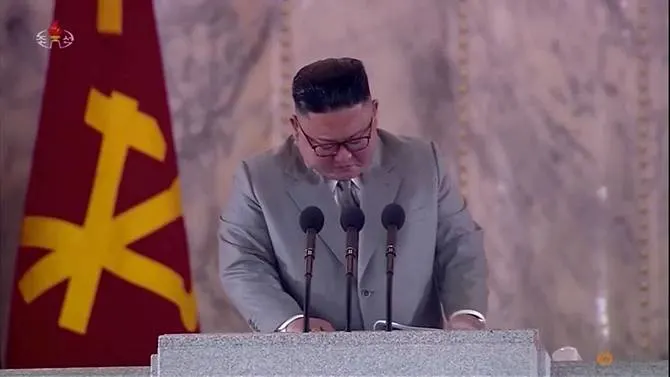'I have failed': Kim Jong Un shows tearful side in confronting North Korea's hardships
13 October, 2020

North Korean leader Kim Jong Un appeared to shed tears at the weekend as he thanked citizens for their sacrifices, in the most striking demonstration yet of how he's counting on his "man of the people" persona to tackle his country's deepening crises.
Although the young leader has consolidated his rule over the isolated nation with ruthless purges, North Korea watchers say he has also sought to portray himself as a more traditional political leader than his eccentric father, Kim Jong Il.
Speaking at a military parade on Saturday, Kim became emotional as he paid tribute to troops for his or her response to national disasters and preventing a coronavirus outbreak and apologized to citizens for failing woefully to raise living standards.
"Kim's modesty and candor, and his tears and choking, were all highly unusual, even for somebody who publicly acknowledges shortcomings and has an established pattern of being expressive," said Rachel Minyoung Lee, an unbiased researcher and former open-source North Korea analyst for the government.
The speech, that was clearly carefully made to resonate with the domestic audience, likely cemented Kim's image as a competent, charismatic leader who also has a human side to him, she said.
'I AM SORRY'
Kim - who broke into wide smiles when huge new ballistic missiles were displayed in the parade - blamed North Korea's continuing monetary hardships on international sanctions, the coronavirus crisis, and a series of damaging typhoons and floods.
Since succeeding his father in 2011, Kim has made monetary progress a cornerstone of his agenda. He also met around President Donald Trump, forming an unprecedented personal relationship that included flowery letters.
But ambitious plans for international trade, construction projects, and other monetary measures have stalled when confronted with sanctions imposed over his nuclear weapons and ballistic missile programmes.
The economy took an additional hit when North Korea closed its borders to practically all traffic as a result of the pandemic, and summer typhoons caused flooding that further threatened food supplies.
"Our people have put trust, as high as the sky and as deep as the sea, on me, but I've failed to always surpass it satisfactorily," Kim said, at one point appearing to choke up. "I am really sorry about that."
Kim said the country's success in protecting against a coronavirus outbreak and overcoming other challenges was a "great victory achieved" by the citizens.
"Our people will always be grateful to our Party, nonetheless it is the one and only themselves who surely deserve a bow of gratitude," he said.
So much give attention to citizens was a significant departure for such events, where speeches are generally filled up with more ideological themes and lauding of the ruling Workers' Party of Korea, said Lee.
"The speech was evidently designed to be for and about the people," she said.
PERSONAL APPROACH
In contrast to his remote father, Kim has taken his wife to political summits with foreign leaders, often stoops to hug children and mingles with personnel at public appearances.
A few of this folksy approach has shaped his public response to the country's monetary challenges, said Benjamin Katzeff Silberstein, a North Korean economy expert at the US-based Stimson Center think-tank.
"Kim has been more personally present and obvious at disaster reconstruction sites and the like, and he's prioritized a lot of the symbolic construction projects designed to show monetary progress," he said.
But despite some early moves towards embracing markets, Kim isn't an out-an-out reformer and his policy prescriptions have tended to draw on the North Korea playbook honed by his father and grandfather, state founder Kim Il Sung, Silberstein said.
The US says that, under Kim, North Korea has continued to quash basic freedoms, maintaining political prison camps and strict surveillance of its citizens.
Kim had his uncle executed, according to convey media, and the United States accused his government of using the chemical warfare agent VX assassinate his half-brother, Kim Jong Nam, in 2017, an allegation Pyongyang has denied.
The other day Kim called on his country to attempt an 80-day "speed battle" - a campaign to achieve monetary goals before a congress in January to decide a new five-year plan.
Such campaigns, which involve citizens performing "voluntary" extra labor, have already been described by some residents as "probably the most exhausting, irritating elements of everyday life", Silberstein said.
"Kim's essentially left with tears, apologies, speed battles and squeezing out funds wherever they are often found," he said.
Source:
TAG(s):
